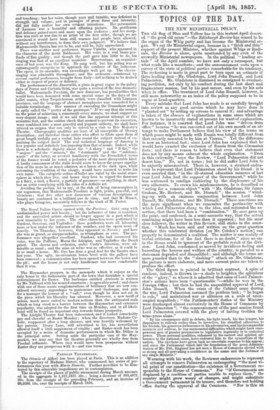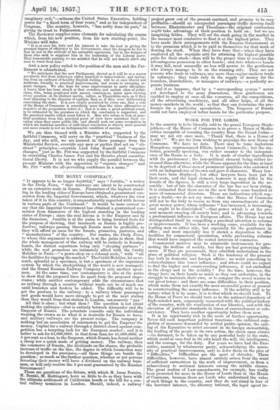TOPICS OF THE DAY.
THE NEW MINISTERIAL POLICY.
TILE old fug of Blue and Yellow has in this instant April deserted "the good old cause "—the Edinburgh Review has ceased to be the organ of the Whig party and has become the Ministerial organ. We say the Ministerial organ, because in a "thick and thin" support of the present Minister, whether against Whigs or Radicals, the Renew is alone, quite unattended by any even of the avowedly Ministerial newspapers. In the political "leading article" of the April number, we have not only a retrospect, but what reads like a manifesto ; and the announcement rests upon a survey of the state of political parties remarkable for its tendency. The reckoning is made in great part to turn upon an estimate of three leading men—Mr. Gladstone Lord John 'Russell, and Lord Palmerston. Mr. Gladstone is dismissed as consigned to everlasting perdition, not only by his conduct during the last short and fragmentary session, but by his past career, and even by his acts when in office. The treatment of Lord John Russell, however, is still more noteworthy as an index of the policy supposed to be in vogue at head-quarters.
Everymistake that Lord John has made is as carefully brought into review as any good serviee which he may have done is "planted out" by setting up screens to conceal it; and advantage is taken of the absence of explanations in some cases which are known to be incorrectly stated at present for want of explanation.. Forinstance, it is asserted that Lord John was "driven from office" because "he was convicted out of his own mouth of an attempt to make Parliament believe that his view of the terms on which peace might be made with Russia was totally different from that recently assented to by him at Vienna." Yet the difference is now an historical fact; since Lord John has explained that he would have exacted the exclusion of Russia from the Circassian forts ; and there is reason to believe that even that statement does not by any means exhaust the whole explanation. "Even in this extremity," says the Review, "Lord Palmerston did, not desert him." No, not in terms ; but he did suffer Lord John to be unjustly misconceived. There is however, a strained endeavour to represent that Lord Palmerston stood by his friend : it is even asserted that, "in the ill-starred education measure of last year Lord John had the slwort of the Government," while he was sentenced to condign cashiering by the displeasure of 'his own adherents. To crown his .misdemeanours he is described as "acting for a common object" with "Mr. Gladstone, Sir James Graham, Mr. Herbert, and Mr. Disraeli" ; the session "winding-up with an ominous conjunction between Lord Sohn Russell, Mr. Gladstone, and Mr. Disraeli." These assertions are the more significant when we remember the pertinacity with which Lord Palmerston clung to the idea, and reiterated the assertion, that there had been a "combination." He once gave up the point, and confessed, in a semi-sarcastic way, that the actual combining might have been less than it appeared ; but his most close follower, the writer in this Review, still sticks to the assertion. "Much has been said and written on the great question whether this celebrated division [on Mr. Qoladen's motion] can properly be denominated a coalition. The matter is one mainly of verbal criticism, for of the fact there is no doubt," since no one in the House could be ignorant of the probable result of the division. Lord John, condemned as moved by invidious feeling and hazarding the honour and welfare of the country, is paraded as a statesman degraded and disqualified ;-and although the terms are more guarded than in the "slashing" attack on Mr. Gladstone, the picture is more elaborate, and more earnest pains are taken to produce the effect. The third figure is painted in brilliant contrast. A spice of
candour, indeed, is thrown in—a shade to heighten the splendour of the "glory," as where it is admitted that some of Lord-Palmerston's actions have been "questionable "—while he was in the Foreign Office ; but then he had the unqualified approval of Lord. John Russell. When the crisis of the Cabinet came during the war, Lord Palmerston assumed the perilous task ; "he began to rule," and maintained war or alliances on a scale of unexampled magnitude ; "the Parliamentary duties of the Ministry were discharged almost exclusively in the House of Commons by Lord Palmerston"; "the commencement of the past session found Lord Palmerston covered with the glory of having trodden the wine-press alone." "By his consummate skill in debate, his light touch, his fine temper, his disposition to ridicule rather than to invective, his steadfast adherence to his friends, his generous forbearance to his adversaries, and his incomparable manners and address, he has surmounted difficulties which might have overpowered men of greater pretensions to legislative ingenuity or to oratorical power. These personal qualities, enhanced by his earnest and spirited adherence to the national cause, have endeared him to the sympathies of the nation. The elections have given hack no uncertain response to his appeal; and since the Parliament which laid the foundation of the great Administration of Mr. Pitt, England has not seen a House of Commons elected with so strong and all-pervading a confidence in the name and the fortunes of any single Minister.'
Warming with his work, the Reviewer endeavours to represent
all attempts to remove Palmerston as endangering "the most vital point of our constitution—the existence of a Government responsible to the House of Commons." For "if Governments are displaced by a coalition of parties unable to replace them," the country might grow weary of changes, and might substitute a Government permanent in its tenure, and therefore not holding office during the approval of the Commons. "Nor is this an . imaginary evil,"—witness the United States Executive, holding power for "a fixed term of four years," and so far independent of Congress. The country, however, "has nobly done its part," in giving its trust to Palmerston.
The Reviewer supplies some elements for calculating the course which, from his new position, from his new starting-point, the Minister will take.
"It is at once his duty and his interest to take the lead in giving the greatest degree of efficiency to his Government, since the dangers he has to fear lie not in the attitude of his ostensible opponents, but in the designs of those who seek to supplant him in the leadership of the Liberal party. That honourable position we are satisfied that he will not tamely allow any man to wrest from him."
And a new policy suited to the position of the man and the Parliament is adumbrated.
"We anticipate that the new Parliament, elected as it will be at a season peculiarly free from influences either fanatical or democratical, and springing,from an outburst of healthy English feeling, will be at once liberal and moderate friendly to practical improvements, and averse to sweeping organic changes. We also hope for some improvement in party discipline. A heavy blow has been struck at that crotchety and useless class of politicians, who,. being perplexed with uneasy consciences, insist upon viewing every question on its abstract merits, rather, as Thucydides says, as if they were listening to the disputes of sophists than as if they were deliberating concerning the state. It is now clearly perceived by every one that a vote of the House of Commons is something more than the mere affirmative or negative of the proposition before it ; that it is also a i
great political event, to be estimated by the premises on which the conclusion s supported, and the ,practical results which must follow it. Men who refuse to look at practical questions from this practical point of view have mistaken their vocation when they enter public life, and should seek out some occupation in which the habitual sacrifice of individual conviction to objects more general and more remote is not an indispensable condition of success."
We are thus blessed with a Minister who, supported by the faithful Commons, will carry on the "practical" business of the day, and who will, we are assured in these passages from the Ministerial Review, override any men or parties that act on " abstract " principles—override Lord John Russell and "organic changes," just as Mr. Pitt was supported by the faithful Commons in overriding Charles James Fox and his theories about constitutional liberty. It is not we who supply the parallel between the present Minister with the opposition to "organic changes" and Mr. Pitt "with the all-pervading confidence in a name.'



























 Previous page
Previous page